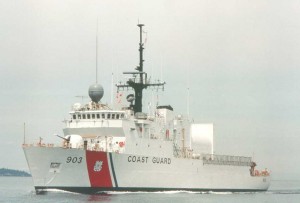Update: Management liability insurer still off hook for policy period lawsuit because claims first made well before then
by Christopher Graham and Joseph Kelly
If you’re a regular reader you may recall our March 2014 post here about a shipbuilder the United States Coast Guard sued under the False Claims Act and common law. Builder converted old cutters into new ones, but there supposedly were serious structural defects. Coast Guard was not happy. And it sued.
Several years earlier, Coast Guard and builder tolled the statute of limitations for Coast Guard’s claims, Coast Guard wouldn’t have to sue then.
When Coast Guard sued, builder sought coverage under the claims-made management liability policy in effect then. But that was long after the tolling agreement and when Coast Guard’s claims were first made. Insurer denied coverage, claiming Coast Guard’s claim was first made before policy inception; and since it was a claims-made policy, there was no coverage.
The court in XL Specialty Ins. Co. v. Bollinger Shipyards, et al, Case No. 12-2071, (E.D. La. Jan 3, 2014) granted a summary judgment for insurer as detailed in our March 2014 post. But conspicuously absent from its opinion was any reference to any policy in effect as of the tolling agreement, when claim was first made.
Well, the mystery about whether there was a policy then was recently solved. In XL Specialty Ins. Co. v. Bollinger Shipyards, Case No. 12-2071 (E.D. La. Mar. 13, 2014), the court addressed builder’s motion for relief from summary judgment. There was a policy effective when claim was first made, as of the tolling agreement. But builder didn’t sue under that policy until after the court held it couldn’t recover under the policy effective when the Coast Guard sued builder. Having waited until after summary judgment for insurer, it was too late for builder to sue under the policy effective when claim was first made, said the court. Presumably there was a reporting requirement, which may have been an issue even if builder was permitted sue. But the court didn’t have to address that issue.
Builder also argued that as a claim made “between the [policy’s] Continuity Date and the end of the D&O Policy,” Coast Guard’s suit was covered. But coverage was conditioned upon a claim first made within the March 1, 2011 to March 1, 2012 policy period, as the court explained. And the claim was first made long before then.
The Continuity Date or “pending or prior date” also doesn’t change the claims-made requirement. The Continuity Date instead controls application of an exclusion for Loss in connection with a Claim “alleging, arising out of, based upon or attributable to” litigation or administrative or regulatory proceedings or investigations pending or prior as of the Continuity Date.
Builder also argued the “Discovery Clause,” triggered by policy cancellation or non-renewal, meant there was coverage for Coast Guard’s claim. But the Discovery Period was merely an additional period for a claim to be made following the Policy Period, for Wrongful Acts before then. And as the court explained, there was no Discovery Period applicable here because insurer neither cancelled nor non-renewed any policy, a condition for availability of the Discovery Period. Plus “the claim giving rise to the underlying suit was first made before the policy period, so the Discovery Period could not affect whether that claim is covered.”
Builder could have avoided this whole mess by providing notice to the management liability insurer when the tolling agreement was about to be signed and claim was first made. This is a recurring problem as we’ve seen in other posts such as here. Is it that lawyers advising about issues such as tolling or the underling cases don’t think about the insurance or assume someone else has or that the insured has the responsibility and needs no advice? Are the brokers not educating their clients sufficiently about the importance of prompt reporting? Why do insureds miss this requirement so frequently? We don’t have the answers. But it continues to be a problem.
Tags: Louisiana, D&O, tolling agreement, management liability policy, private company D&O policy, directors and officers liability policy, executive liability policy, claim, policy period, discovery period, prior and pending exclusion, continuity date, pending or prior date, claims-made policy
Category: D&O Digest, Professional Liability Insurance Digest Comment »

